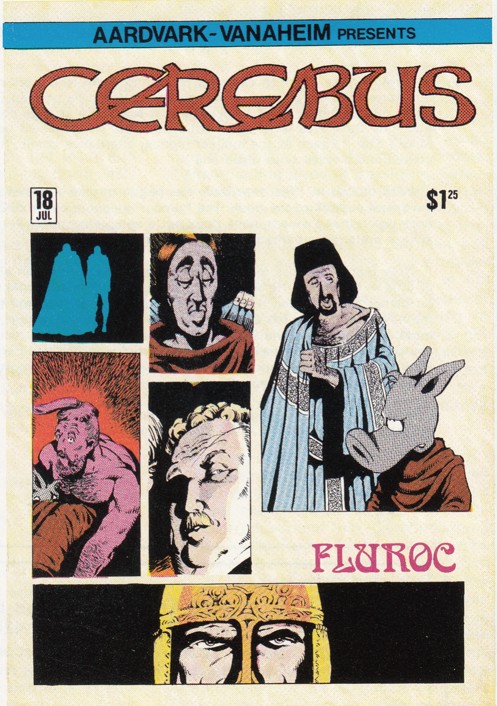
This is the kind of cover that probably kept me thinking this book was too adult for me and that I should just stick to Groo and Elfquest.
In Dave's Swords of Cerebus essay, he explains how he didn't know what the fuck he was doing when he was writing this story and I'll tell you a secret: it fucking shows. He explains how he wrote one idea but realized that idea wasn't going to work and then wrote some other ideas but they weren't going anywhere and then he went back to the first idea and wrote a small novella which still wasn't going to work so then he tried some other idea but couldn't really get anywhere and pretty soon his week that he plans for writing was over and he just had to start drawing one of the scenes. So he picked one and strung it out and then he needed a new scene and took the Lord Julius epilogue and stick that on page 5 and 6. By that time, he sort of had a new idea with the help of his brother-in-law and even though that new idea was pretty lame, what more could he do?! He doesn't admit that his new story is lame; I think he thinks he really pulled one out at the last minute. But it's really kind of lame.
I get it though! He's written seventeen previous stories (plus some Cerebus stories that appeared in other magazines) and they were all pretty good and working toward building a portrait of Estarcion and Cerebus and some kind of weird aardvark mystery. He was due to slip up some time! I'm just glad he was honest about how the writing part when all wrong and since he couldn't fall behind on the art, he had to just kind of start drawing and hope for the best. I suppose in that regard, the comic wasn't so bad. It told a coherent story that moves Cerebus' plans for the invasion of Palnu ahead and Dave even gets some funny jokes in. But as far as the extended story goes, not much happens? Cerebus and the T'gitans took over Fluroc by murdering everybody in it and then needed more money for troops and they got more money for troops by conning a merchant that came to town. That's it! That's the whole story!
Did we need this story? Probably not! But did we really need any Cerebus story so far? Almost certainly not (with the exception of all the stories that showcased new characters!). But what I really liked about this comic book was the Aardvark Comments section! Things are really getting good finally! It's not just a few nerdy nerds nerding it up for Dave Sim.
I get it though! He's written seventeen previous stories (plus some Cerebus stories that appeared in other magazines) and they were all pretty good and working toward building a portrait of Estarcion and Cerebus and some kind of weird aardvark mystery. He was due to slip up some time! I'm just glad he was honest about how the writing part when all wrong and since he couldn't fall behind on the art, he had to just kind of start drawing and hope for the best. I suppose in that regard, the comic wasn't so bad. It told a coherent story that moves Cerebus' plans for the invasion of Palnu ahead and Dave even gets some funny jokes in. But as far as the extended story goes, not much happens? Cerebus and the T'gitans took over Fluroc by murdering everybody in it and then needed more money for troops and they got more money for troops by conning a merchant that came to town. That's it! That's the whole story!
Did we need this story? Probably not! But did we really need any Cerebus story so far? Almost certainly not (with the exception of all the stories that showcased new characters!). But what I really liked about this comic book was the Aardvark Comments section! Things are really getting good finally! It's not just a few nerdy nerds nerding it up for Dave Sim.
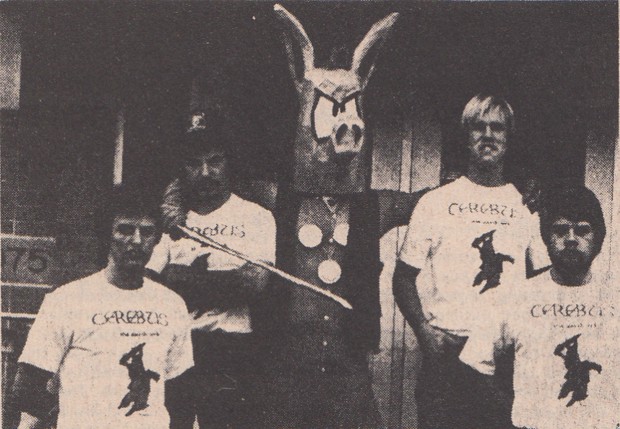
I mean, it is some nerdy nerds nerding it up nerdily!
The first letter is what I'm assuming was the introductory or cover letter from Marvel's Jim Shooter when he sent out contracts to prospective employees.
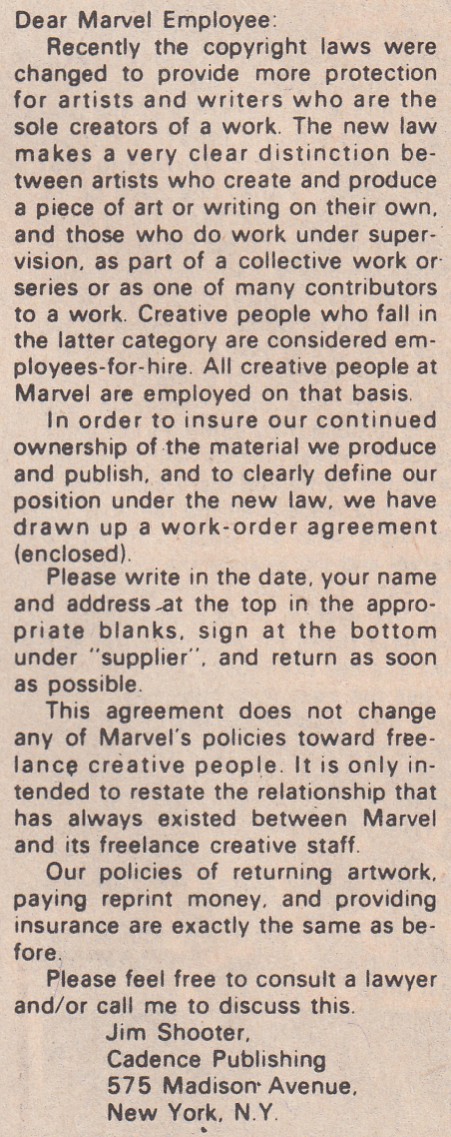
Is this the worst thing Jim Shooter ever wrote? Sadly, it is not.
If you're one of those people who like to describe 95% of everything as "cringe," you'll love Dave Sim's response:

Remember, this was 1980 and "written blackface as hyperbolic response" was probably just something taught in creative writing classes.
Casually whistling past the terrible method of his response the way you simply steer the conversation away from racist tirades every time your grandfather speaks up at Thanksgiving dinner, this feels like the first time Sim really calls out the two big publishers and how they conduct business. It'll become a hallmark of Dave Sim in his crusade for independent publishers. And this sarcastic and also racist response (I can only whistle nonchalantly for so long!) isn't his only response in this Aardvark Comments. But as his first response, I'll assume it's the most closest to how he truly feels about Marvel and DC. In 1980, he's already calling them out on their practice of stealing their employees' intellectual properties. Okay, "stealing." The contract is to make the "stealing" legal so they don't wind up in constant lawsuits and can continue to offer the artists whose creations make them scads of money little to no future compensation on their efforts. Dave Sim could think of no other attack on Marvel than to pretend he's a caricature of a slave. I'm not in disagreement with Dave here and, believe me, in 1980, I almost certainly wouldn't have thought the mintrelesque response was anything but a clever way of making his point. Although I was also 9 in 1980 so I probably would have had to ask an adult why the fuck Dave was writing like that.
But as I said, there's more! The next letter is a bit of a response to Dave's crusade against the Big Two Corporations. And from his peers!
But as I said, there's more! The next letter is a bit of a response to Dave's crusade against the Big Two Corporations. And from his peers!
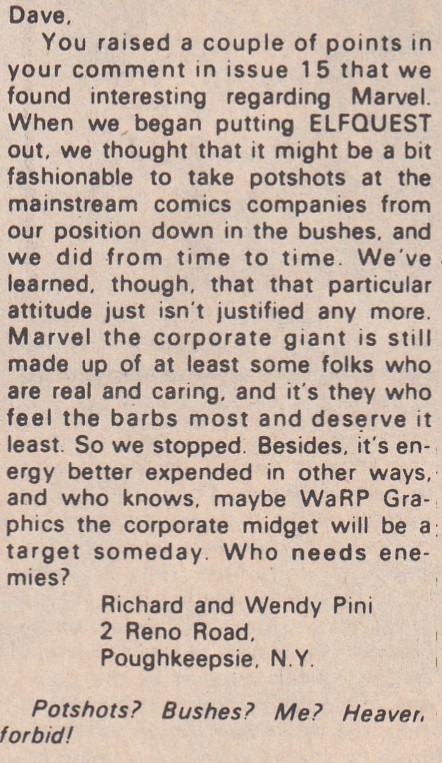
I guessed I missed the comments in Issue #15. I'd better go back and see what the Pinis were talking about.
Here's what Dave said in Issue #15's "Aardvark Comment": "Maybe Marvel can turn its corporate back on you. As they never grow tired of explaining, fan sales make up a very small fraction of their profits. They don't think much of your taste in comics, artists, writers or anything else." It's a little hard to parse this comment being that I don't know what was happening in comic books in 1980 concerning the fans and Marvel but doesn't this sound a lot like the Comicsgate argument of today? That Marvel doesn't give a shit about what its "real fans" want? Anyway, back to the Pini's letter.
The Pinis' letter reads like Elfquest trying to talk Cerebus out of gutting a merchant. I suppose when you point out that artists and writers working for Marvel and DC are idiots for not publishing their work as an independent, I can see how they might get upset with you. I'm sure Richard and Wendy had a number of discussions with Marv Wolfman where Marv would say things like "I'm not dumb! You're dumb!" or "I'm not a piece of property! You are!" or "I'll show you who's a slave to the man! I'll kill Cyborg!" After that, the Pinis were probably all, "You know what? Criticizing work-for-hire in the comic book arts just isn't worth all these Marv Wolfman tantrums. Let's just bite our tongues."
After a couple of letters from some nerd groupies in which Dave laments the target audience of comic books, he responds more in length to the . . . well, wait. Let's first look at his response about his core audience!
The Pinis' letter reads like Elfquest trying to talk Cerebus out of gutting a merchant. I suppose when you point out that artists and writers working for Marvel and DC are idiots for not publishing their work as an independent, I can see how they might get upset with you. I'm sure Richard and Wendy had a number of discussions with Marv Wolfman where Marv would say things like "I'm not dumb! You're dumb!" or "I'm not a piece of property! You are!" or "I'll show you who's a slave to the man! I'll kill Cyborg!" After that, the Pinis were probably all, "You know what? Criticizing work-for-hire in the comic book arts just isn't worth all these Marv Wolfman tantrums. Let's just bite our tongues."
After a couple of letters from some nerd groupies in which Dave laments the target audience of comic books, he responds more in length to the . . . well, wait. Let's first look at his response about his core audience!
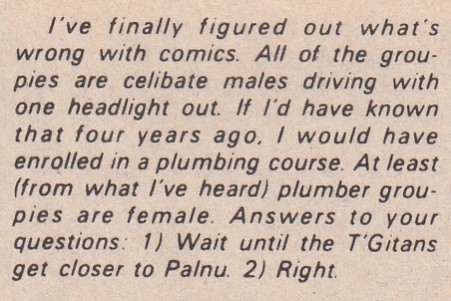
I'm offended! I always fix it immediately when a headlight goes out.
I mean, after seventeen issues, "Aardvark Comment" is finally getting interesting! Okay, so now to Sim's actual response to Wendy and Richard Pini.

Dave Sim being serious. Probably.
I'd like to point out the end of this letter in which Dave states fairly plainly the main theme of criticism behind Eee! Tess Ate Chai Tea for nearly a decade: "I just don't happen to think that the system in operation now is the best thing for this medium and that it is not the most conducive way to get the best from the creative talents that exist. Quite the opposite, it seems to encourage half-assed efforts in order to guarantee that you are not surrendering your rights to something of value. And how many of us, Steve Gerber included, could know in advance that our ducks were of any value?" This was as true in 1980 as it is now. It's just that in 1980, it was much harder and a lot more work to retain the rights to your creations through self-publishing. So most comic book writers and artists were doing their best work at DC and Marvel. What other reasonable choice was there? Dave and Deni have discussed multiple times across the last dozen and a half issues how hard self-publishing has been for them. Now imagine a company like Image exists or a place like Kickstarter. Creators now know to save their best ideas for places that will give them full control and full potential earnings on their creations. DC and Marvel can't help but be full of writers doing half-assed jobs with their half-assed ideas and saving their truly monumental and mind-blowing work for Image or another, now more easily accessible independent publishing venture. This was in 1980 and Dave Sim was seeing creators screwed out of future royalties on ideas that wound up making fortunes for the parent companies. Some people accept this as business as usual and would be able to garner no sympathy for a creator stiffed out of royalties. But those people are unimaginative, pitiable, and sad. Something being legal has never in the history of everything been a convincing argument that that something is ethical, moral, or just fucking compassionate.
Hopefully this "Aardvark Comment" begins to stir some serious discussion with Cerebus readers because I'm eager to read a lot more of Dave's thoughts about comic book publishing and fandom. Eventually there won't be a whole lot of separation between the comic book and the letters page. I mean, when the author inserts himself into the story as both some sort of omniscient being and also another fictionalized author, it gets hard to separate what you believe from the ideas expressed within the story.
Cerebus #18 Rating: B-. That rating was for the lackluster story! The "Aardvark Comment" page gets an A! Oh, and I forgot to mention "The Single Page!" Imagine my surprise when I turned the page and saw this:
Hopefully this "Aardvark Comment" begins to stir some serious discussion with Cerebus readers because I'm eager to read a lot more of Dave's thoughts about comic book publishing and fandom. Eventually there won't be a whole lot of separation between the comic book and the letters page. I mean, when the author inserts himself into the story as both some sort of omniscient being and also another fictionalized author, it gets hard to separate what you believe from the ideas expressed within the story.
Cerebus #18 Rating: B-. That rating was for the lackluster story! The "Aardvark Comment" page gets an A! Oh, and I forgot to mention "The Single Page!" Imagine my surprise when I turned the page and saw this:

Tim Kreider in 1989! (Remember, this is from the 1989 Bi-weekly reprints of the 1980 Cerebus #18.)
You can just see Tim's eventual style in these early characters. The main male character is basically a baby-faced version and immature style of his eventual renditions of himself.

This is from Tim Kreider's book of essays and cartoons, We Learn Nothing.
I can't recommend Tim Kreider's essays and cartoons highly enough. Read his books, We Learn Nothing and I Wrote This Book Because I Love You and maybe search the Internet for a cache of his old cartooning website. You probably won't be disappointed. I say probably because I've learned that a lot of people on the Internet aren't exactly like me like I expect you all to be. Idiots.

No comments:
Post a Comment